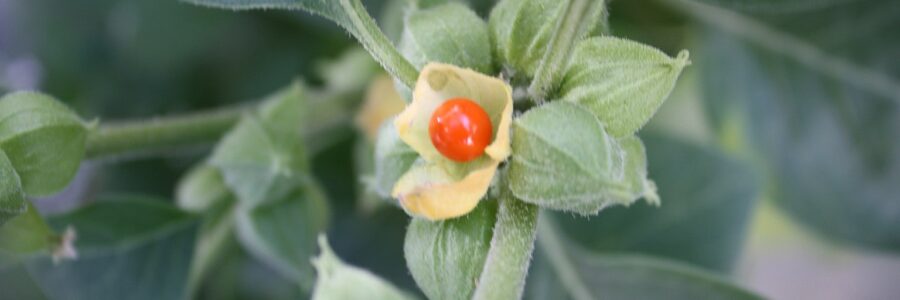Of the many herbs known for their stress-relieving properties, the one getting the most attention lately is Ashwagandha. Also known as “Winter Cherry” or Withania Somnifera, Ashwagandha is grown in India and is a longstanding part of India’s traditional Ayurvedic medicine. It is also used in traditional Chinese herbal medicine, where its root is known as Nan Fei Zui Jia.
What is an “Adaptogen?”
Ashwagandha is in a class of herbs called adaptogens. Adaptogens help the body manage or recover from stress, anxiety, and fatigue. Many different plants and mushrooms have active ingredients that are considered adaptogens, with each different plant or mushroom offering slightly different benefits.
To be considered an adaptogen, a plant must be non-toxic in normal doses, help the body cope with stress, and allow your body to return to balance or homeostasis.
How Effective is Ashwagandha?
Several research studies support the health benefits of Ashwagandha, which include stress relief. Here are key findings from evidence-based studies of Ashwagandha:
· Improves resistance to stress
· May increase testosterone and fertility in men
· Improves athletic performance and oxygen utilization
· Can improve memory function
· May reduce inflammation
· Can reduce high blood sugar levels
· May reduce mental health symptoms such as depression, insomnia, and anxiety
Ashwagandha and Skin Health
For those who suffer from acne, eczema, TSW, and psoriasis, acute or chronic stress can play a role in flare-ups. That’s why taking Ashwagandha capsules or teas may help maintain calm and reduce instances of flare-ups.
Also, struggling with a skin condition itself can be stressful, and cause emotional or psychological distress. Ashwagandha, with its ability to reduce depression, anxiety, and insomnia, may be a helpful part of a self-care plan to restore balance to both body and mind.
In one research study, Ashwagandha showed a potential to decrease psoriatic skin lesions and inflammation. Another study showed that Ashwagandha had the potential to decrease skin inflammation when applied topically.
However, if your skin condition is a result of an immune system imbalance, watch carefully, as Ashwagandha can sometimes enhance immune activity. This can help some people but may pose trouble for others. Additionally, if Ashwagandha is an ingredient in a topical product you are using, treat it as you would any other ingredient – watching carefully for any allergy or sensitivity you may have.
Also, if you are already taking a TCM herbal medicine formula for your skin condition, it’s advisable to talk to your TCM doctor before taking Ashwagandha. While it’s safe to consume TCM herbal formulas along with other herbal teas or supplements throughout your day, other herbs – like Ashwagandha – may reduce or enhance the effects of your TCM herbal medicine.
Usage, Side Effects or Contraindications
Ashwagandha is normally taken as a powder, capsule, or tea, and is sometimes applied topically in Ayurvedic medicine for inflammation. As with all herbal medicines, be sure to buy from a reputable source to assure that you are getting a pure, high-quality product. As with all good things, more is not always better. Research shows results in doses of 200 – 500 mg of Ashwagandha once per day over a period of weeks.
Specific herbs can sometimes be contraindicated, and Ashwagandha is no exception. There are reported side effects such as diarrhea, vomiting, drowsiness, and digestive discomfort. If you notice these symptoms after taking ashwagandha, stop using it until you can talk with a health professional.
Ashwagandha is not recommended for people who are pregnant or nursing, or those with liver, thyroid, or autoimmune problems. It is contraindicated for those with hormone-sensitive prostate cancer. Also avoid Ashwagandha if you are planning to have surgery soon, or if you currently take barbiturates, anticonvulsants, or benzodiazepines.
Summary
The evidence-based results delivered by Ashwagandha reinforce that this herbal medicine can be a powerful and safe addition to a health and wellness plan for most people, with less risks and side effects than most prescription drugs.
Want to Learn More About Skin Health?
Click HERE to get the Amethyst Holistic Skin Solutions Newsletter. You’ll receive interesting information about skin health via articles, before/after pictures, case studies of Amethyst patients, videos, interviews and more. Feel free to share this article with someone who you think may benefit.
About the Author
Olivia Hsu Friedman, LAc, Dipl.OM, DACM, Cert. TCMDerm, is the owner of Amethyst Holistic Skin Solutions and treats Acne, Eczema, Psoriasis, and TSW. Olivia treats patients via video conferencing using only herbal medicine. Olivia is Chair of the Board of Directors of the American Society of Acupuncturists, serves on the Advisory Board of LearnSkin, and is a faculty member of the Chicago Integrative Eczema Group sponsored by the National Eczema Association.



